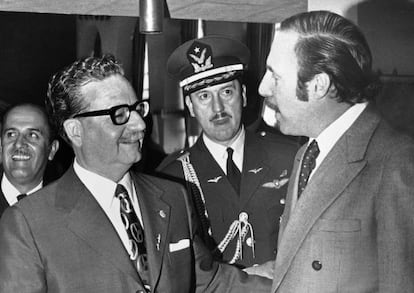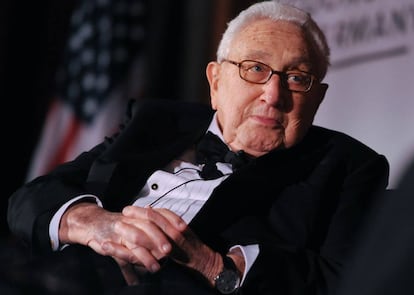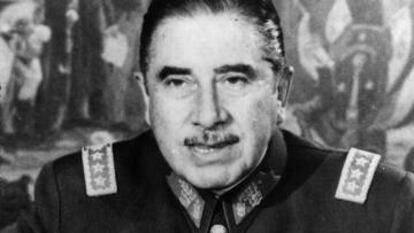The day that Chile’s Augusto Pinochet turned his sights on Washington DC
US capital observes 40th anniversary of the death of exiled politician Orlando Letelier in a car bomb


Orlando Letelier, a Chilean politician who served under Salvador Allende, was assassinated in Washington DC on September 21, 1976, exactly 40 years ago today.
A car bomb went off in the heart of the US capital’s diplomatic neighborhood, taking the lives of the former minister and of his young American aide, Ronni Moffit.
Letelier’s closest circle immediately pointed the finger of blame at Chile’s dictator, Augusto Pinochet, who had deposed the Allende government in a 1973 military coup.
The last thing I want to be is a person who simply thinks about revenge
Francisco Letelier, son of Orlando Letelier
But it would be years before US authorities recognized the authorship of the first terrorist attack sponsored by a foreign government in Washington DC.
Letelier, an exile in the US ever since Pinochet stripped him of Chilean nationality, was in a hurry that morning. Tireless in his efforts to restore democracy in his country, he needed to get to the Institute for Policy Studies (IPS) quickly. The center served as a forum for Letelier’s public denunciation of the Pinochet dictatorship, and he wanted to proofread an article meant for publication in The New York Times, refuting allegations that he was a traitor to his country.
Letelier was known to be a bad driver, so when his assistant Juan Gabriel Valdés got a call about a road incident, he immediately thought that his boss had crashed the car. The truth – that a commando had been sent in from Chile to plant a bomb under Letelier’s car, and that it had gone off in the middle of Washington DC – was simply inconceivable.
Even Letelier himself, who had been getting more and more death threats in recent times, did not believe that Pinochet would dare attack him in the city that was also home to one of the dictator’s greatest allies, US State Secretary Henry Kissinger.

In time, the US government began considering the assassination of Letelier and Moffit “evidence of the criminal nature of the Chilean regime and of similar regimes in the region,” notes Juan Gabriel Valdés, who went on to become the Chilean ambassador in Washington.
An FBI investigation also “opened up a space for human rights investigations in Argentina and other countries,” he adds.
The Jimmy Carter administration kept its distance with Chile and other Latin American dictatorships, but a complete break with Pinochet would not occur for another decade.
Letelier was known to be a bad driver, and his assistant initially thought he had crashed the car
On that fateful September 21, a 17-year-old Francisco Pancho Letelier was at school when he was informed that something bad had happened to his dad. The FBI was waiting back at his Bethesda house, where he lived with his mother Isabel and three siblings – including current Chilean senator Juan Pablo Letelier.
“All of us, one by one, told them that clearly the perpetrator was Augusto Pinochet,” recalls Francisco, now an artist who lives in California.
The first evidence that Pinochet ordered the attack, and that the US knew it, did not see the public light until a year ago. In October 2015, US State Secretary John Kerry handed Chilean President Michelle Bachelet a series of declassified files on the matter.

One of these documents was a secret memorandum written in 1987 by the secretary of state at the time, George Shultz, and meant for Ronald Reagan. The note asserted that the CIA felt there was “convincing proof” that Pinochet had personally ordered his intelligence chief [Manuel Contreras] to prepare the assassination.”
That CIA report has not been released yet. It is believed to be part of a trove that is yet to see the light. Peter Kornbluh, a journalist who has been fighting for nearly four decades for the release of secret US documents on Chile, calls this report “the Holy Grail in the history of this first act of international terrorism in the US capital.”
Getting it declassified is important “not just for the families of the victims, but in order to understand how a foreign government was able to commit a terrorist act in the capital and not pay for it.”
The assassination “is part of the history of terrorism that we need to understand to be better prepared to stop other attacks in the future,” says Kornbluh.
Forty years later, the memories of that crime remain alive.
English version by Susana Urra.
Acts of tribute
Ambassador Valdés trusts that the Obama administration will soon declassify the 60 or so remaining documents. The reply to Chile’s request has been “very encouraging,” he notes, hoping that this will happen in time for the tribute events planned for Thursday and Friday in the US capital.
Chilean President Michelle Bachelet will be on hand to visit a mural created by Letelier’s son Francisco.
The artist says he has spent his entire life trying to follow his mother’s advice on the day of the assassination: not to let the crime teach him to hate.
“The last thing I want to be is a person who simply thinks about revenge, because that would be the dictatorship’s greatest victory,” he says.
But Letelier’s son believes it is essential for the US to deliver the missing files so that the case may be definitively closed. And he notes there there is still some homework to do on the issue of the former state secretary.
“We have not yet undone the Henry Kissinger myth; he is still viewed as the epitome of astuteness in foreign policy,” he says. “As a Chilean and as a Latin American, I join millions of people in Asia, Cambodia and Vietnam who feel that he is a criminal who needs to be brought to trial. His legend must be investigated.”
Tu suscripción se está usando en otro dispositivo
¿Quieres añadir otro usuario a tu suscripción?
Si continúas leyendo en este dispositivo, no se podrá leer en el otro.
FlechaTu suscripción se está usando en otro dispositivo y solo puedes acceder a EL PAÍS desde un dispositivo a la vez.
Si quieres compartir tu cuenta, cambia tu suscripción a la modalidad Premium, así podrás añadir otro usuario. Cada uno accederá con su propia cuenta de email, lo que os permitirá personalizar vuestra experiencia en EL PAÍS.
¿Tienes una suscripción de empresa? Accede aquí para contratar más cuentas.
En el caso de no saber quién está usando tu cuenta, te recomendamos cambiar tu contraseña aquí.
Si decides continuar compartiendo tu cuenta, este mensaje se mostrará en tu dispositivo y en el de la otra persona que está usando tu cuenta de forma indefinida, afectando a tu experiencia de lectura. Puedes consultar aquí los términos y condiciones de la suscripción digital.








































